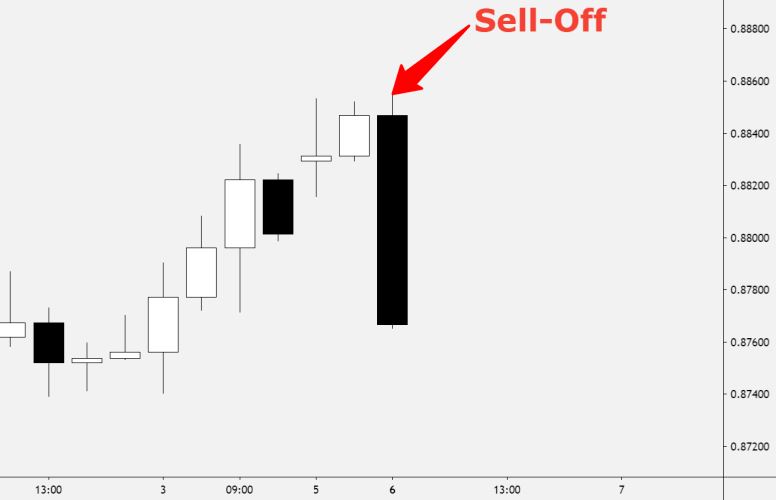When trading, you should expect both ups and downs. Things are fine for investors when the price levels of their investments rise. However, the value of those investments will surely fall at some point. We all know that there are both highs and lows in a market.
A sell-off, on the other hand, is distinct. It refers to the increased sale of assets.
In this article, we’ll explain in detail what a sell-off is. So, persevere until the end if you want to become a trade expert.

What is a sell-off?
A sell-off occurs when many traders abruptly sell their holdings of an asset. This could be as a result of bad or shocking news. We define it as a brief duration of ferocious selling precipitated by falling prices.
Dumping is another term for sell-offs. This is because traders usually try to get rid of their holdings as soon as possible. This increase in sales volume causes prices to fall even further.
We may better call it a rapid sale of assets. It is a short- or medium-term fall in prices instead of a long period of declining prices. Even though sell-offs can be intense and increase your heartbeat, they are usually brief drops. They quickly stabilize or reverse themselves.
How do sell-offs operate?
Sell-offs take place due to the supply and demand concept. Let’s assume that several traders wish to liquidate their holdings. If there is no consequent rise in the number of buyers, the price goes down.
In this case, supply exceeds demand. Market psychology is reflected in sell-offs. We can use sell-offs to describe price fluctuations in securities.
Example
For instance, a sell-off starts right after a company issues its annual earnings report. It implies that when the stocks are bought, investors might be overoptimistic.
If the earnings report reveals a drop in profitability, shareholders will lose hope. To get a return on investments, they may sell their stocks quickly. The investor’s action has an instant effect on the forex market rate. It gradually declines.
Spotting a sell-off
In a period of economic uncertainty, the ability to spot a sell-off can be a reliable tool. A number of events can cause a sell-off to occur. Such happenings can be hard to anticipate. But, you must know how to deal with them when they eventuate
Unexpected Occurrences
The unusual has always been and will always be a major contributor to stock market sell-offs. Suppose a company’s quarterly report falls short of analysts’ expectations. One or more companies reporting bad results may trigger mass-selling.
Their erratic nature can severely erode the worth of investment holdings. So be cautious because they are difficult to foresee.

Financial activity
There is no shortage when it comes to news about the overall economy’s development or inability. This will have a significant impact on the market’s behavior.
Any significant, negative advancements will suggest that the marketplaces are destined downward for the future.
Technical indication
Technical indicators can provide insight into the direction of stocks, currencies, or stock indexes. Some of the indicators are Average convergence divergences, Relative strength index, and head and shoulder patterns.
Bottom line
As a trader, you should be able to predict a sell-off before it even occurs. No doubt, it can be tough to predict negative earnings and extreme events. But, understanding how to deal with them after they occur is invaluable.


